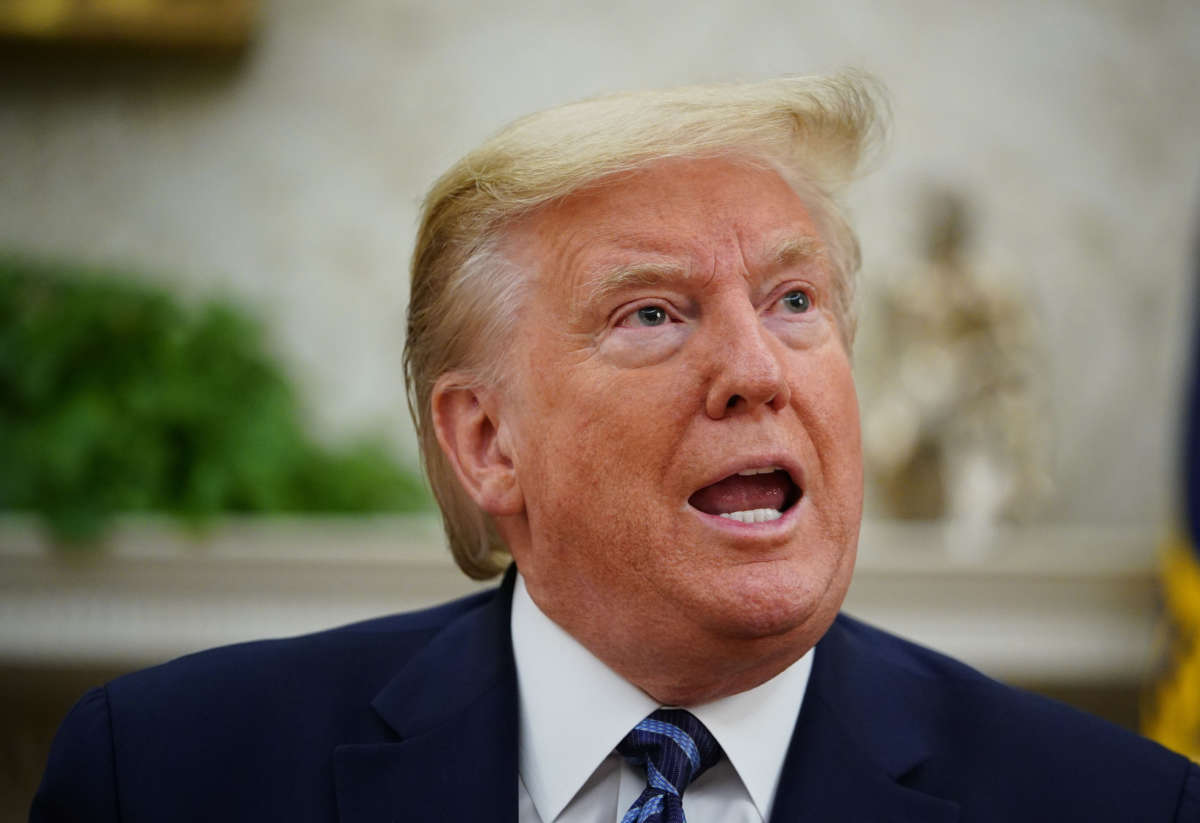Did you know that Truthout is a nonprofit and independently funded by readers like you? If you value what we do, please support our work with a donation.
During a Fox News interview this past weekend, former President Donald Trump appeared to admit that he had fired James Comey, the former director of the FBI, in order to hinder his investigation into Russian interference in the 2016 presidential race.
Trump, who was speaking with Fox News’s Mark Levin about a forthcoming photo book detailing his time in the White House, discussed Comey’s firing in terms of how it had helped him personally, leading many to suggest that the former president was admitting that his action constituted an obstruction of justice.
“A lot of people say to me, how you survived is one of the most incredible things,” Trump told Levin.
“Don’t forget, I fired Comey,” he went on. “Had I not fired Comey, you might not be talking to me right now about a beautiful book about four years in the White House, and we’ll see about the future. If I didn’t fire Comey, they were looking to take down the president of the United States… I don’t think I could’ve survived if I didn’t fire him.”
Trump fired Comey from his leadership role at the FBI just five months into his tenure as president, a decision that was met with widespread outrage. This ultimately resulted in Deputy Attorney General Rod Rosenstein appointing Robert Mueller to take over the investigation. At the end of his inquiry, Mueller concluded that Trump had engaged in at least 10 actions that could be construed as obstructions of justice, including his firing of Comey.
Mueller stopped short of recommending Department of Justice (DOJ) charges against Trump, leading the former president to falsely claim that he had been exonerated. In May 2019, Mueller clarified his findings, saying, “If we had had confidence that the president clearly did not commit a crime, we would have said so.”
Several commentators noted that Trump’s words were an admission of wrongdoing, and warranted action from the DOJ going forward.
“Trump basically just admitted to obstruction of justice,” wrote Chris Williams, an editor for Above the Law. “I’m sure his lawyers are happy about this.”
“There are still six months left before the statute of limitations kicks in. [Trump] must be prosecuted,” wrote Sanho Tree, a fellow at the Institute for Policy Studies, a progressive think tank.
“Donald Trump has committed more crimes publicly and admitted to them publicly than anyone you have ever seen in this country and he just keeps coming out of hiding to admit to more because even he can’t believe how much he gets away with,” said Democratic strategist and consultant Adam Parkhomenko.
Notably, Trump never faced consequences for any of the 10 examples Mueller laid out in his eponymous report. However, Trump did face obstruction charges later on, in the first of two impeachment proceedings. These charges were the result of his failure to cooperate — and his orders that his staff refuse to cooperate — with the investigation into his alleged attempts to coerce Ukrainian officials into helping him defeat Joe Biden in the 2020 election.
But even if Congress had impeached Trump for his obstruction regarding the Russia investigation or Comey’s firing, he could still be charged again now as a private citizen. Although the Constitution does not permit an individual to be charged for the same crime twice, impeachment is a constitutional matter; indeed, a DOJ memo from 2000 concluded that former presidents can still be charged for offenses they were impeached for after they leave office.
“The Constitution permits a former President to be criminally prosecuted for the same offenses for which he was impeached by the House and acquitted by the Senate while in office,” the memo noted.
In theory, then, it would be possible for Trump to be charged with any of the 10 examples of potentially obstructive actions he took during the Mueller/Russia investigation, including Comey’s firing and measures he took during the Ukraine scandal.
Matching Opportunity Extended: Please support Truthout today!
Our end-of-year fundraiser is over, but our donation matching opportunity has been extended! All donations to Truthout will be matched dollar for dollar for a limited time.
Your one-time gift today will be matched immediately. Your monthly donation will be matched for the whole first year, doubling your impact.
This matching gift comes at a critical time. As Trump attempts to silence dissenting voices and oppositional nonprofits, reader support is our best defense against the right-wing agenda.
Help Truthout confront Trump’s fascism in 2026, and have your donation matched now!
